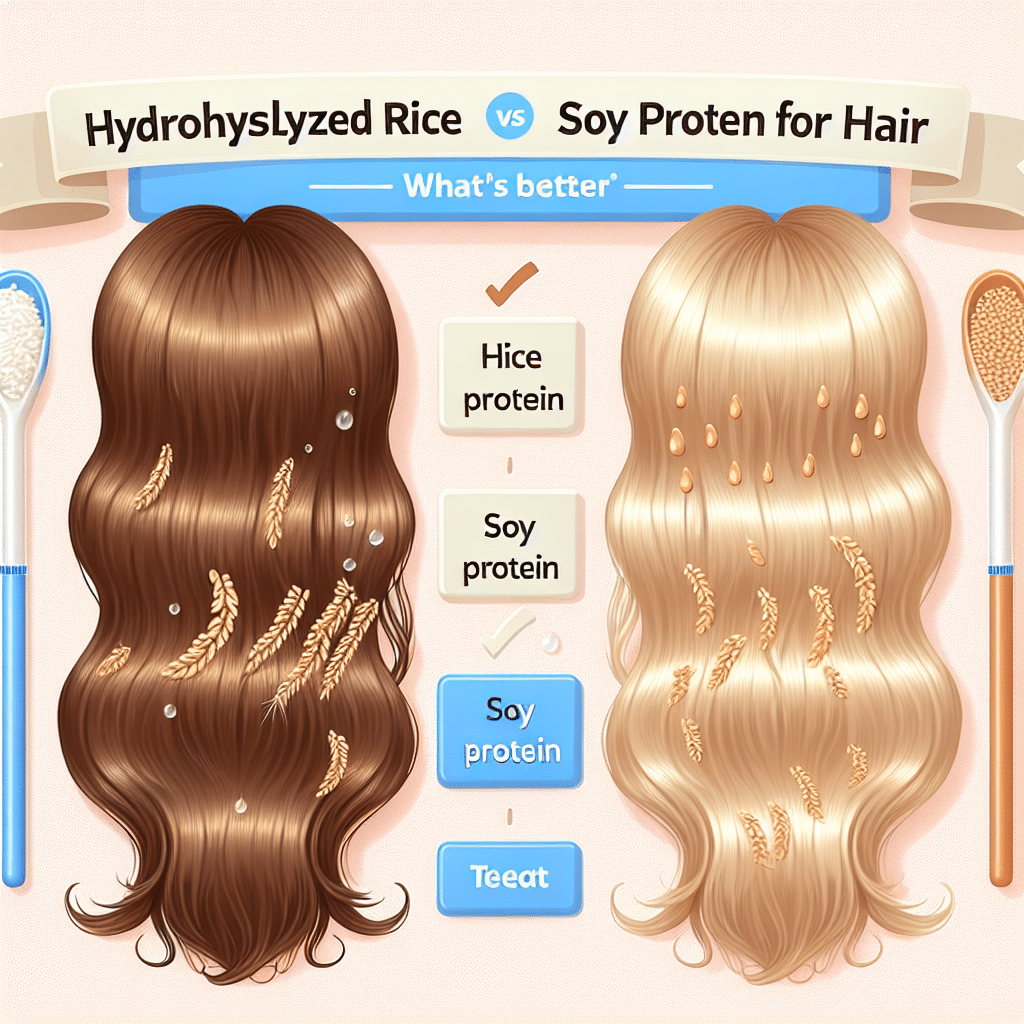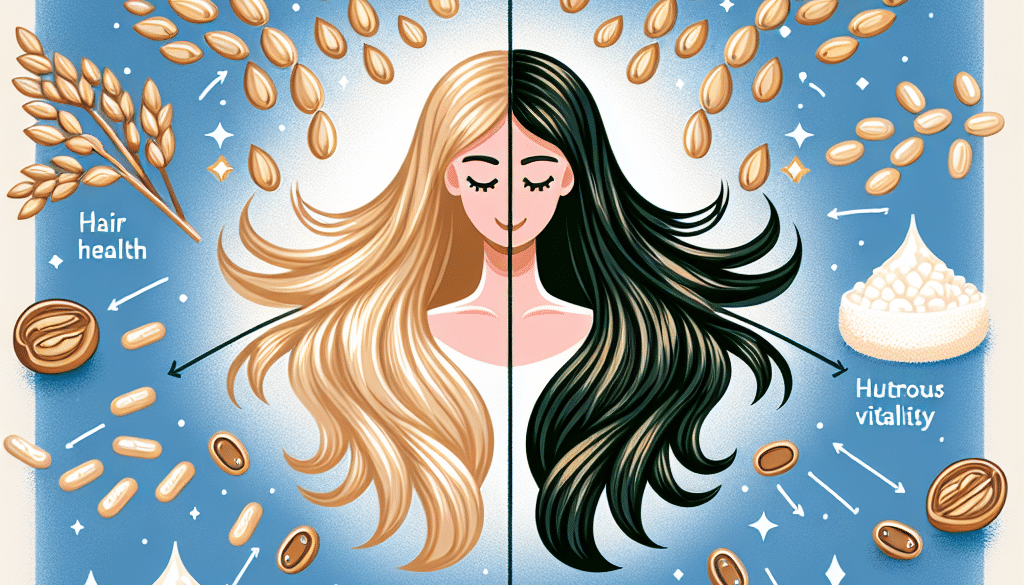Hydrolyzed Rice vs Soy Protein for Hair: What’s Better
-
Table of Contents
- Hydrolyzed Rice vs. Soy Protein for Hair: A Comprehensive Comparison
- Understanding Hair Structure and the Role of Protein
- Hydrolyzed Rice Protein for Hair
- Soy Protein for Hair
- Comparative Analysis: Hydrolyzed Rice vs. Soy Protein
- Scientific Research and Case Studies
- Consumer Preferences and Trends
- Conclusion: Making the Right Choice for Your Hair
- Discover ETprotein’s High-Quality Protein Products
Hydrolyzed Rice vs. Soy Protein for Hair: A Comprehensive Comparison

When it comes to hair care, the ingredients in the products we use can make a significant difference in the health and appearance of our hair. Proteins, in particular, are vital for hair strength and growth. Among the various types of proteins used in hair care products, hydrolyzed rice and soy proteins have gained popularity. But which one is better for your hair? This article delves into the benefits and drawbacks of hydrolyzed rice and soy proteins for hair care, providing you with the information you need to make an informed decision.
Understanding Hair Structure and the Role of Protein
Hair is primarily composed of a protein called keratin, which provides strength and elasticity. Over time, hair can become damaged due to environmental factors, chemical treatments, and mechanical stress, leading to the breakdown of these proteins. This is where hydrolyzed proteins come in. They are small enough to penetrate the hair shaft and replenish lost protein, thus restoring hair’s strength and resilience.
Hydrolyzed Rice Protein for Hair
Hydrolyzed rice protein is derived from rice grains and is known for its volumizing and moisturizing properties. It is rich in amino acids that can help to strengthen hair, increase its ability to retain moisture, and improve its overall appearance.
- Nourishment and Repair: Hydrolyzed rice protein contains both positive and negative charges, which help it to bind to hair. This can lead to improved hair manageability and nourishment.
- Volumizing Effect: It can increase hair volume by up to 32%, making it an excellent choice for those with fine or limp hair.
- Environmental Protection: Hydrolyzed rice protein also provides a protective barrier against environmental stressors like UV rays.
Soy Protein for Hair
Soy protein, derived from soybeans, is another popular ingredient in hair care products. It is known for its ability to improve hair texture and to repair and condition hair that has been damaged.
- Moisture Retention: Soy protein is effective in retaining moisture in the hair, which is essential for maintaining hair elasticity and preventing breakage.
- Repair and Conditioning: It helps to smooth the hair cuticle, making hair appear healthier and more lustrous.
- Hair Growth: Some studies suggest that soy protein can also promote hair growth due to its genistein content, a compound that may stimulate hair follicles.
Comparative Analysis: Hydrolyzed Rice vs. Soy Protein
When comparing hydrolyzed rice and soy proteins for hair care, it’s important to consider several factors such as protein size, compatibility with hair type, and potential benefits.
- Protein Size: Hydrolyzed rice protein has a smaller molecular size compared to soy protein, which may allow for better penetration into the hair shaft.
- Hair Type Compatibility: Hydrolyzed rice protein is particularly beneficial for fine or thin hair due to its volumizing effects, while soy protein is more suited for damaged or treated hair.
- Benefits: Both proteins offer unique benefits, with rice protein focusing on volumizing and protection, and soy protein on moisture retention and repair.
Scientific Research and Case Studies
Several studies have been conducted to evaluate the efficacy of hydrolyzed proteins in hair care. For instance, a study published in the International Journal of Cosmetic Science found that hydrolyzed rice protein significantly increased hair volume and elasticity. Similarly, research on soy protein has shown its ability to improve hair texture and strength.
Case studies from various hair care brands also support the benefits of these proteins. Brands that have incorporated hydrolyzed rice protein into their formulations report improved customer satisfaction regarding hair volume and shine. On the other hand, products with soy protein are often praised for their conditioning effects and ability to reduce frizz.
Consumer Preferences and Trends
Consumer trends also play a role in the popularity of these proteins. With the rise of clean beauty and the demand for natural ingredients, both hydrolyzed rice and soy proteins are favored for their plant-based origins. However, preferences may vary based on individual hair concerns and desired outcomes.
Conclusion: Making the Right Choice for Your Hair
In conclusion, both hydrolyzed rice and soy proteins offer distinct advantages for hair care. The choice between them should be based on your specific hair type and concerns. For those seeking volume and protection, hydrolyzed rice protein may be the better option. If moisture retention and repair are your priorities, soy protein could be more beneficial.
Ultimately, the best approach is to try products containing these proteins and observe how your hair responds. It’s also advisable to consult with a hair care professional who can provide personalized recommendations based on your hair’s condition.
Discover ETprotein’s High-Quality Protein Products
If you’re looking for top-notch protein ingredients for your hair care formulations, ETprotein offers a range of exceptional products. Their organic rice protein and soy protein are perfect for enhancing the quality of hair care products, providing the benefits of strength, moisture, and protection.
About ETprotein:
ETprotein, a reputable protein Chinese factory manufacturer and supplier, is renowned for producing, stocking, exporting, and delivering the highest quality organic bulk vegan protein and plant proteins. They include Organic rice protein, clear rice protein, pea protein, clear pea protein, pumpkin seed protein, sunflower seed protein, mung bean protein, etc. Their offerings, characterized by a neutral taste, non-GMO, allergen-free attributes, cater to a diverse range of industries. They serve nutraceutical, pharmaceutical, cosmeceutical, veterinary, as well as food and beverage finished product distributors, traders, and manufacturers across Europe, USA, Canada, Australia, Thailand, Japan, Korea, Brazil, and Chile, among others.
ETprotein specialization includes exporting and delivering tailor-made protein powder and finished nutritional supplements. Their extensive product range covers sectors like Food and Beverage, Sports Nutrition, Weight Management, Dietary Supplements, Health and Wellness Products, and Infant Formula, ensuring comprehensive solutions to meet all your protein needs.
As a trusted company by leading global food and beverage brands and Fortune 500 companies, ETprotein reinforces China’s reputation in the global arena. For more information or to sample their products, please contact them and email sales(at)ETprotein.com today.












